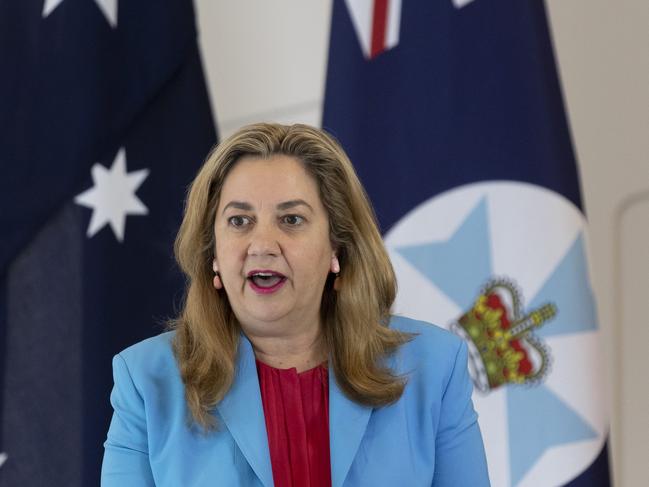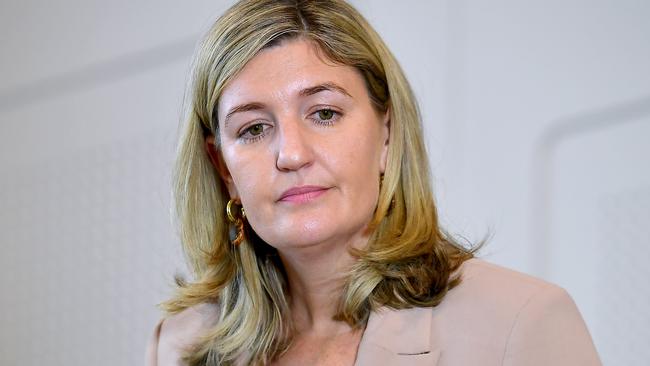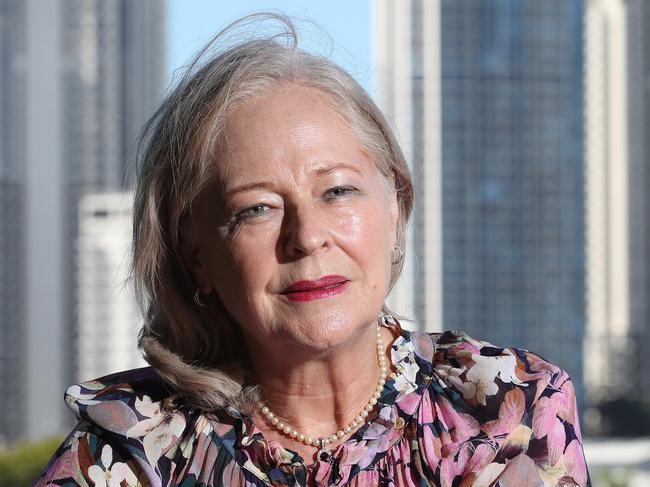Women’s Safety and Justice Taskforce recommends overhaul of sex crimes and consent laws
Queensland could see affirmative consent laws introduced, as well as the decriminalisation of sex work and the publishing of accused rapists’ IDs, among 188 recommendations to be handed down by the Women’s Safety and Justice Taskforce. SEE THE RECOMMENDATIONS
Police & Courts
Don't miss out on the headlines from Police & Courts. Followed categories will be added to My News.
Survivors of sexual assault have told harrowing stories of being subjected to invasive rape kits only to have their perpetrators DNA “lost”, while others travelled hundreds of kilometres for testing, only to be turned away.
The experiences of hundreds of women and girls have been laid bare in the second report of the Women’s Safety and Justice Taskforce, with DNA collection procedures and shortfalls in the spotlight.
Other possible outcomes from the report is the introduction of affirmative consent laws, as well as the decriminalisation of sex work.
The Taskforce on Friday delivered its second and final report, Hear Her Voice 2, after it examined the experiences of victims of sexual violence, as well as women and girls who are accused or convicted of criminal offences.
It made 188 recommendations for “essential reform”, including education campaigns aimed at dispelling rape myths.
“We heard, listened to and acted on the voices of victim-survivors of sexual assault,” Taskforce chair Margaret McMurdo said.
“They told us that rape myths made them feel blamed and shamed and that this added to their trauma.
“Victim survivors told us they want changes to the law about sexual assault so the focus is on the actions of the accused person, not what the victim said, did, drank or wore.”

Annastacia Palaszczuk said the report was “the most comprehensive report of its kind in Australia” and thanked the more than 700 people who had made submissions to the Taskforce.
Attorney-General Shannon Fentiman thanked Ms McMurdo and the expert panel for their work.
“How do we get more and more women to come forward so that they are not retraumatised by the criminal justice system?” she said.
One woman told the taskforce she had travelled 1300km for an examination, only to be turned back due to a miscommunication.
Another victim-survivor said she was subjected to “invasive swab tests to collect the perpetrator’s DNA”.
“I remember thinking ‘what’s the point if (police are) telling me it’s my fault?’
“About a month later I got a phone call to say that the police had accidentally destroyed the rape kit/DNA evidence and that they were ‘very sorry’. This meant the case had no real chance of proceeding.”
Other women told the taskforce they were left without food, water or clothing for extended periods in busy hospital departments while waiting for the test.
One forensic doctor told the taskforce she was concerned the examinations were “intrusive and can be re-traumatising”, and the value to the investigation had to outweigh the negative impact on the victim.
Ms Fentiman said she was aware of women having issues at hospitals in being able to access forensic testing.
“I know even women In Logan sometimes had trouble when there weren’t specialist staff available,” she said.
“We want to make sure that when women come forward, no matter where they are in Queensland, they get the forensic testing they need for a successful prosecution of the sexual assault and will absolutely be working with the Minister for Health.
“We need to double our efforts to make sure that no matter where women are in Queensland, they can access forensic testing.”
Earlier this month Annastacia Palaszczuk announced a Commission of Inquiry into DNA testing at Queensland’s Forensic and Scientific Services, to be headed by retired judge Walter Sofronoff.
The taskforce made a number of recommendations with regards to forensic testing, including the establishment of a statewide forensic examination service to ensure timely and high quality forensic medical services.
It also recommended Queensland Health must review and update the Sexual Assault Investigation Kits used in Queensland to ensure they are at least of consistent quality as those used in New South Wales and Victoria.
Queensland Health, Queensland Forensic and Scientific Services and the Queensland Police Service were also recommended to “develop and implement an interim memorandum of understanding and service level agreement, pending the outcomes of the Commission of Inquiry into Queensland DNA testing as a priority.”.
Ms Fentiman thanked the brave women who came forward to tell their stories.
“We will now consider all of the recommendations, and there are many of them,” Ms Fentiman said.
“This is significant reform.”
She said that included consent laws and “mistake of fact” and “how we actually run a campaign in the community about what consent means”.
Ms Fentiman said the report also looked at modernising the language in the criminal code “which I think is well overdue”.
Ms Fentiman said the Taskforce recommended the wording of consent laws should be changed from “consent should be freely and voluntarily given” to “freely and voluntarily agreed to”.
Women and girls no longer wish to be the sole gatekeepers of sexual propriety,” the report said.

“Women and girls want it understood that sexual activity requires mutual agreement before it occurs and both parties to a sexual encounter should take responsibility for ensuring that there are no misunderstandings. Women and girls want the law to reflect that.”
The report said that women and girls had reported being asked questions like:
“What did you do to let him know that you didn’t want him to touch you like that?”
“Did you move his hand away?”
“Did you leave the room?”
“Did you run away?”
“How could he have known if you didn’t push him away?”
“How could he have known if you didn’t say no?”
“How could he have known when he had so much to drink?”
“How could he have known?”
Ms Fentiman said the report also recommended strengthening the law around mistake of fact, including that if the victim has suffered grievous bodily harm, it is taken that consent was not agreed to.
She said work was needed to dispel rape myths
‘Rape myths still exist. We have to do more to work with the community so people understand when a woman comes forward and reports sexual assault, we need to believe her,” Ms Fentiman said.
“Let’s not forget juries sit on sexual assault cases, so we need everyone in our community to understand these rape myths.”
Ms Fentiman said the naming of accused sex offenders was one of the “key recommendations” of the Taskforce.
Queensland is one of the last states in Australia to protect the identities of accused sex offenders until evidence is tested at committal.
“This is a protection that is not available for people accused of other types of offences, even the most serious offence of murder,” the report says.
“Victim-survivors told the Taskforce that they felt the reputational risks for the accused person were given undue consideration.”
One victim told the Taskforce: “My abuser is afforded protection and privacy, as his name cannot be printed alongside the serious offences he has been charged with, which means unsuspecting young women can still be a guest at his (business), they can still apply for a job in his (business) without having any idea that he is an opportunistic predator who doesn’t respect the employer/employee boundary.”
The Taskforce found any potential reputational damage caused by media reporting is outweighed by the desire for open justice, “including the importance of media reporting on this often hidden but prevalent issue”.
“On balance, the Taskforce did not consider there was an ongoing justification for treating charges for certain sexual offences differently to all other criminal offences,” the report said.
“The Taskforce also noted that increased media coverage about charges against an alleged perpetrator of sexual violence may encourage other people who were assatuled, particularly by that alleged perpetrator, to come forward and report.”
The Taskforce previously examined domestic and family violence, releasing the first Hear Her Voice report that detailed 89 recommendations on how to improve the system for victims.
Those recommendations included the criminalisation of coercive control and the establishment of a Commission of Inquiry into police responses to domestic violence.
The State Government chose to adopt all 89 recommendations.
Among today’s recommendations is “changes to the definition of consent and the excuse of mistake of fact”.

“The fundamental importance of healthy, intimate relationships is that they are based on respect and mutual agreement about consent,” Ms McMurdo said.
Other recommendations include a new model within the office of the Director of Public Prosecutions for the prosecution of sex offenders.
The Taskforce has also recommended bringing Queensland into line with other states to allow the publication of the identity of someone charged with serious sexual offences immediately.
Currently, an accused rapist’s identity is protected until they are committed to stand trial – a process that can take two to three years.
Every other type of offender is not given the same protection, which is designed to prevent “reputational damage” to the accused sex offender until the evidence is tested at committal.
AMONG THE RECOMMENDATIONS
– The establishment of a statewide forensic examination service to ensure timely and “high quality” forensic medical services.
– Changes within the Queensland Police Service to encourage victims to report sexual violence and reduce the number of reports withdrawn.
– The establishment of an independent victims’ commission.
– Changes to evidence laws to provide more protection for victims and the admissibility of certain evidence in domestic and family violence and sexual violence cases.
Recommendations to help women and girls who are accused persons or offenders include:
– Training for police, law students, lawyers and judicial officers on gendered issues, such as how to better interview First Nations women and girls.
– Limiting the time women and girls can be held in watch houses.
– Decriminalising sex work.
– A review about whether minor drug matters can be dealt with more appropriately through a health response.


